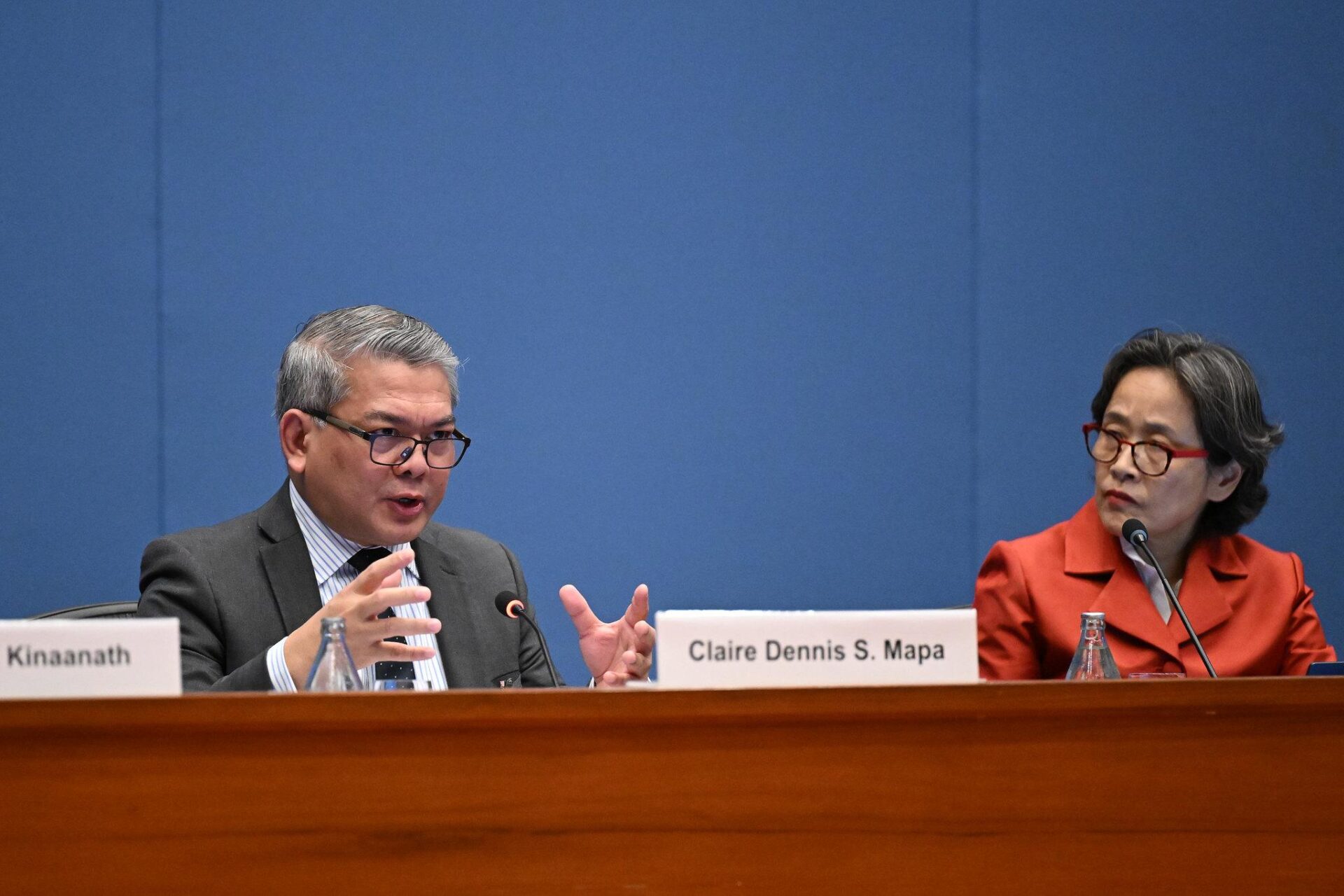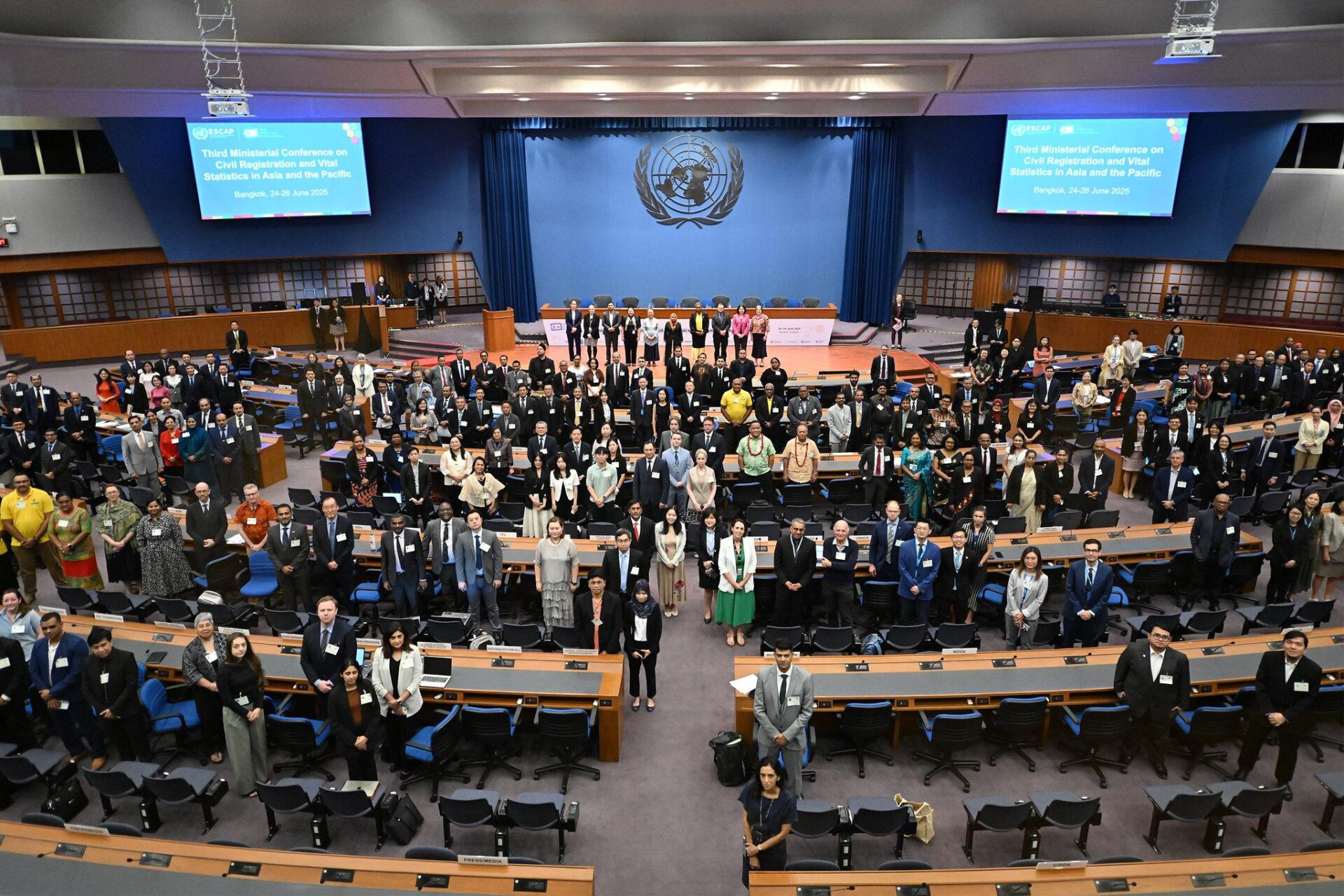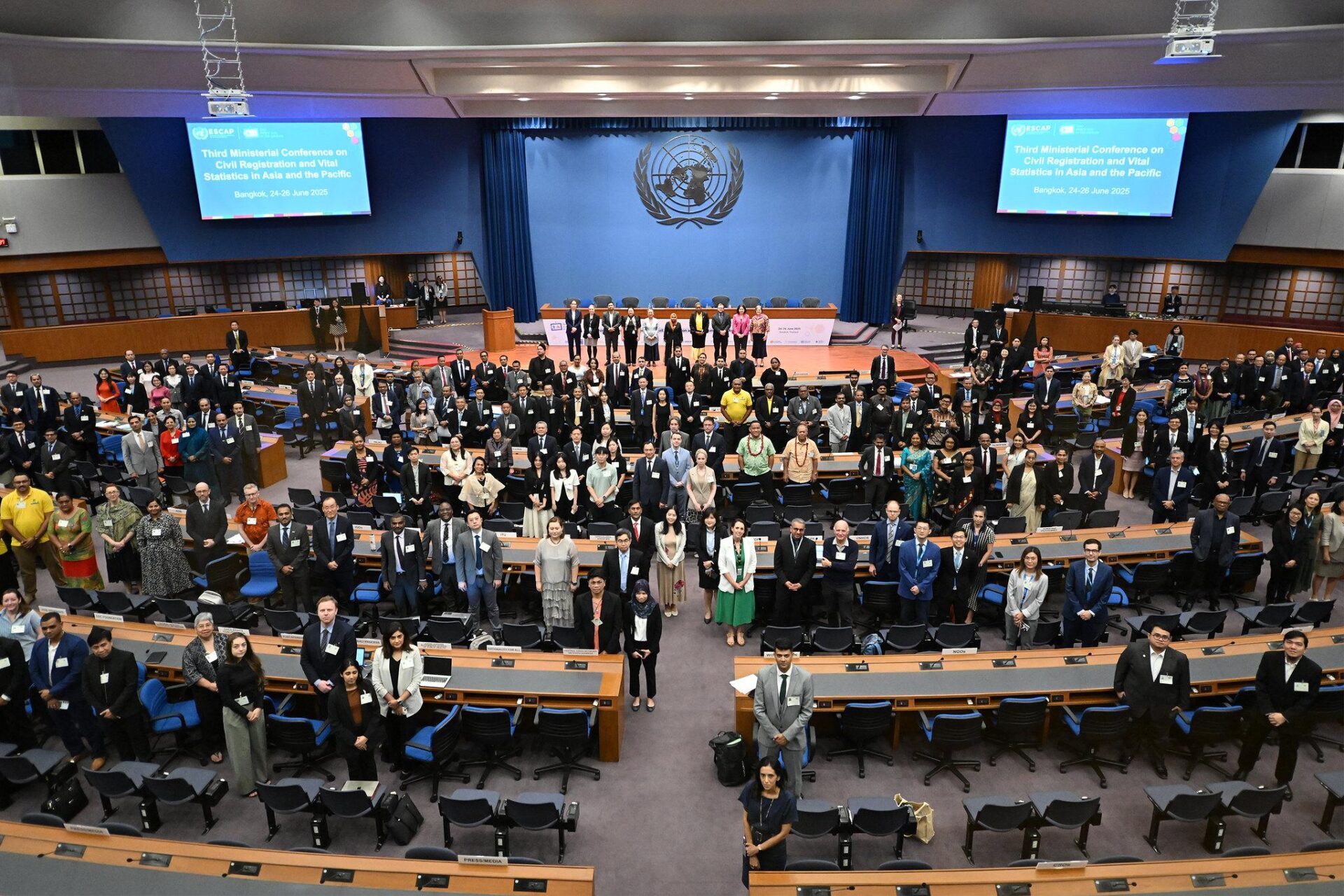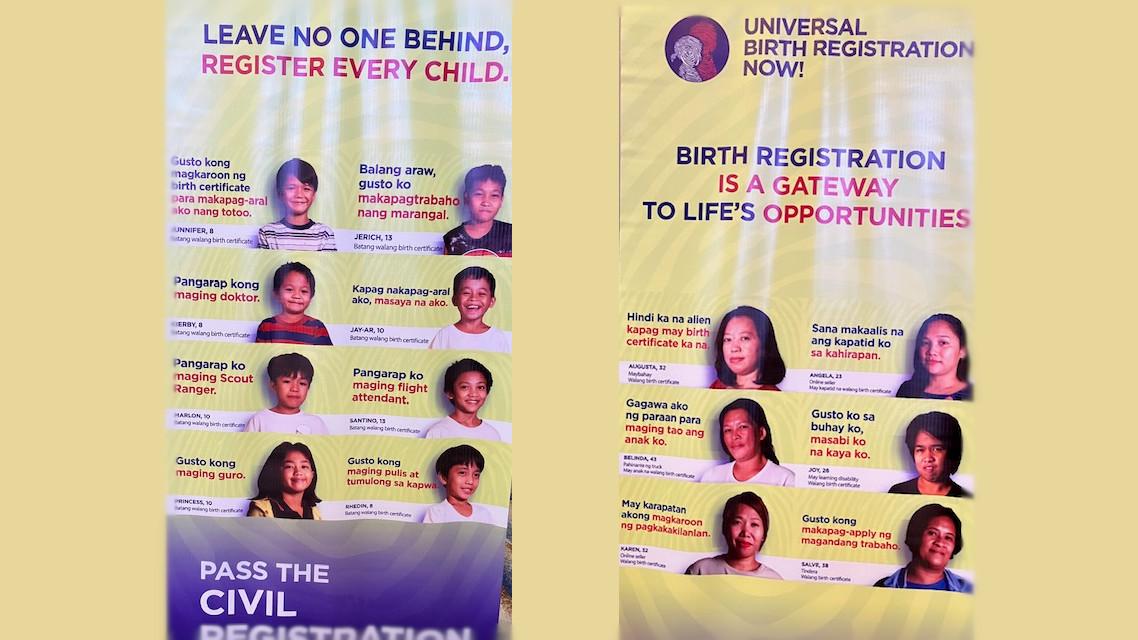BANGKOK – For achieving more than 90% coverage of birth and death registration using technology and involving government and civil society partners, the United Nations cited the Philippines as a global model during a ministerial meeting that concluded here last June 26.
The country’s improved civil registration and vital statistics (CRVS) system was recognized as a “best practice” by the UN during the Third Ministerial Conference on CRVS in Asia and the Pacific (June 24-26) held at the UN Conference Center in Bangkok. It was attended by officials responsible for health, justice, planning, civil registration, statistics and finance.
The Philippines shared the honor with Bangladesh, Cambodia, Maldives, Papua New Guinea, Sri Lanka, Solomon Islands, Thailand and Vietnam.
Undersecretary Claire Dennis Mapa, National Statistician and Civil Registrar General of the Philippine Statistics Authority (PSA), led the Philippine delegation and was voted vice chairperson of the ministerial segment of the conference, along with vice chairs from Vietnam and Vanuatu, and Fiji as head.
In an interview with journalists on the sidelines of the conference, Mapa said, “Our target is 99.5% of individuals’ birth registration and we expect to achieve this and higher starting in 2025.”
In 2020, he said birth and death registration was at 96.6%, still high despite the struggles of the government during the Covid-19 pandemic, a reality that many countries in the region also experienced.
Mapa said the country has done well and still trying to improve in many areas, such as reaching sectors that have yet to be given legal identities.
“We are doing our best to register the vulnerable populations, senior citizens, persons in the geographically isolated and disadvantaged areas, Muslims and indigenous peoples (IPs),” he said.
“We have data and we know who doesn’t have registration but this is promising because hundreds of thousands will be registered under this project,” he added.
Honor for the Philippines

Mapa was referring to the Birth Registration Assistance Project that deploys mobile registration teams to provide free civil registration services to vulnerable groups.
The project was recognized as a “best practice” in the 2025 UN Economic and Social Commission in Asia and the Pacific (ESCAP) report, “Progress made on Civil Registration and Vital Statistics in Asia and the Pacific after a Decade of Getting Every One in the Picture.”
The report was launched before an audience that included journalists from Asia-Pacific who attended a parallel media training program on the effective use of data in public health reporting.
The ESCAP report cited the Philippines, along with Thailand, in improving its recording of cause-of-death data by investing in the training of medical doctors in certifying causes of death in line with requirements of the International Classification of Diseases.
Also noted was the country’s legal review of the legal framework for medico-legal death investigations that enhanced the fragmented and overlapping jurisdictions of agencies.
In support of this initiative, the Global Health Advocacy Incubator (GHAI), a partner of the Bloomberg Philanthropies Data for Health Initiative, assisted the Department of Health (DOH) in drafting an administrative order and joint circular to address these issues.
The report cited the Philippines for enacting its CRVS Law in 2015, declaring its own national CRVS Decade and designating February as CRVS Month through executive orders, and was also cited for improving its outdated policy.
Again, the GHAI assisted in drafting an Omnibus CRVS law, which was approved on third and final reading last June 4 by the House of Representatives. There was no counterpart bill from the Senate, though.
Mapa said an improved bill that incorporates technology use and funding for vulnerable sectors will be proposed to the 20th Congress that will open on July 28.
The ESCAP report said the measure, once adopted, will allow systems to be digitalized, processes to be streamlined, fees to be removed, access to be improved and responsibilities to be clarified.
Missed opportunity
Despite the bill’s approval by the Lower House in the 19th Congress, 64 organizations under the Child Rights Network (CRN) expressed disappointment over the Senate Committee on Justice and Human Rights’ inaction on the CRVS measure, calling it “a missed opportunity to pass a landmark, people-centered reform that could secure legal identity for millions of Filipinos, including over one million children.”
The measure was well within reach of becoming a law had timely action been taken by the Committee, the advocates said.
Nenita Dalde, spokesperson for the CRN, said “many Filipinos still lack opportunities in life simply because they don’t have a birth certificate — IPs, those born outside of hospitals, and those in remote areas.”
“This bill could have made the late registration process easier, more affordable, and more accessible, while putting in place proper safeguards against fraud, especially in light of recent controversies involving late registration,” added Dalde.
She said the bill seeks to make the CRVS system more accessible and responsive to current realities, as it has been the product of wide-ranging consultations with the CRN, Senate and House authors, PSA, Department of Foreign Affairs, DOH, and local civil registrars.
The PSA estimates that of the 1.3 million children aged zero to 14 who have no official birth records, and who are among the 3.7 million unregistered Filipinos, most are from the Bangsamoro Autonomous Region in Muslim Mindanao, whose five provinces have the lowest unregistered births in the country.
Five years left to 2030

At the conclusion of the conference, governments across Asia and the Pacific adopted a landmark decision to ensure that all births are registered and all deaths are recorded by 2030, ushering in the next chapter of the CRVS Decade.
In 2014, the ESCAP proclaimed the Asia and Pacific CRVS Decade (2015–2024) and called on its 53 members and nine associate members to commit to a goal that by 2024, all people in the region would benefit from universal and responsive CRVS systems that facilitate their rights to health, education and development.
Now on its new decade, the governments reaffirmed their shared vision of enabling good governance, strengthening public health and driving sustainable development through CRVS systems that can withstand future crises and reach everyone.
Progress in the region include the following: unregistered children under five has dropped to 51 million today from 135 million in 2012, a reduction of more than 60%, and 29 countries now register over 90% of births within a year, while 30 countries have the same for death registration, with improved quality of cause-of-death reporting.
By end-2024, three fourths of state members had met their targets for timely death certificate issuance, a progress partly driven by national laws requiring a death certificate to proceed with burial or cremation, such as in Maldives, Northern Mariana Islands, Philippines and Türkiye.
Another highlight for the Philippines is its requirement for a death certificate in order to access funeral arrangements, insurance, pensions and estate settlements.
In November 2024, the Philippines, Australia, Thailand and Turkmenistan joined the Global Alliance to End Statelessness that was launched by the UN High Commissioner for Refugees to facilitate the documentation of stateless persons and vulnerable groups, including IPs and children in need of special protection.
Mapa said a key component of this work is the integration of CRVS with the Philippine Identification System (PhilSys), the country’s national digital identity platform.
Due to the Covid-19 pandemic, the CRVS Decade was extended to 2030 to align with the UN Sustainable Development Goals (SDGs), a set of 17 goals agreed on by 193 UN member-states that aim for balanced social, economic and environmental sustainability to end poverty, hunger, AIDS, and discrimination.
“We have five years left until 2030, and we have a lot more to do but we are on track with our goals,” Mapa said.

